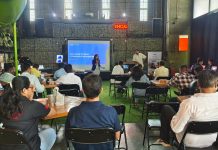The North East Sustainable Development Goals Conclave 2020 is currently underway in Guwahati. On Day 2 of the Conclave, four technical sessions were held which saw active participation from senior officials of the governments of all 8 North Eastern states as well as the central government, academia, civil society organisations, think tanks and financial institutions.
The first session on SDGs in the North Eastern Region: Pathways for Localisation and Achievement was chaired by Dr. Inderjit Singh, Secretary Ministry of Development of North Eastern Region (DoNER), Govt of Assam. Chief Secretaries, Additional Chief Secretaries and other senior officials from the state governments of Arunachal Pradesh, Assam, Manipur, Meghalaya, Mizoram, Nagaland, Sikkim and Tripura were panellists at the session.Against the backdrop of the existing reality of SDG localisation in the country, efforts and achievements of each North Eastern State were set forth. The session concluded with a shared perspective of future course of action with respect to achieving SDGs and associated targets in the context of the North Eastern region.
The second session on Drivers of Economic Prosperity < Sustainable Livelihoods waschaired by Shri Rajiv Bora, Additional Chief Secretary, Finance, Govt of Assam. The panelincluded representation from the central and state government, academia, financial institutions and the private sector.
The session focused on the potential of MSMEs, agro-processing and handicrafts sectors so as to align with India’s export ambitions as articulated in the Act East Policy.
The Third Session on Climate Adaptive Agriculture was chaired by Prof Ramesh Chand, Member NITI Aayog.The session brought out the challenges of the environmental impact of high-external- input-driven agriculture and sustained agricultural productivity. Technology based interventions in climate adaptive agriculture were analysed with a view to appraising their wider adaptability or replicability in the region. Prospects of knowledge development, capacity building and institutional partnerships were assessed in order to explore actionable possibilities.
The final technical session for Day 1 on Nutrition Security





